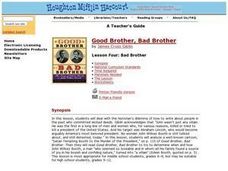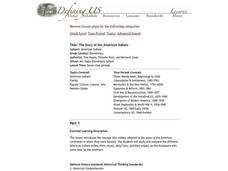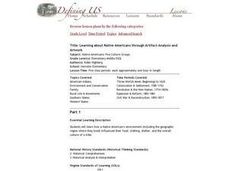Curated OER
Reliving History through Slave Narratives
Helpful for an American literature or history unit, this lesson prompts middle schoolers to examine slavery in the United States. They read slave narratives that were part of the Federal Writers' Project and then conduct their own...
Curated OER
Jazz in America
Students learn where Jazz came from and why it is an important part of America's history.
Curated OER
Jazz in America
Learners explore different instruments and what role they play in Jazz. They also each person's role in a democratic society.
Curated OER
The Exploration of the Writer, His Louisiana History And the Autobiography of Miss Jane Pittman By Ernest J. Faines
Students identify the significance of the author's experiences on his written work; describe the hardships faced by slaves and plantation owners once the caves were set free; explain the role of the Seceses and why they were a threat to...
Curated OER
Legal Definitions of Childhood
Students examine how various cultures define childhood. Using the internet, they research how countries around the world determine who is a child. They identify the sources they most relate with as a child.
Curated OER
Kensington Mansion: Plantation, Sharecroppers, Tenants
Eleventh graders investigate the significance of the Kensington Mansion. In this South Carolina history lesson, 11th graders take field trips to the mansion and research primary and secondary sources about plantations, sharecropping, and...
Curated OER
Bad Brother
Students deal with the historian's dilemma of how to write about people in the past who committed wicked deeds. They analyze a well-known cartoon, "Satan Tempting Booth to the Murder of the President."
Curated OER
Bill of Rights
US history classes explore constitutional rights as they relate to court cases involving teens. Your class must already be familiar with the Bill of Rights before beginning this series of exercises. In preparation for a debate-style...
Curated OER
ANTICIPATORY SET
Learners are be able to analyze primary sources (photographs and speeches) and write a definition of American Democracy. They are shown a photograph of Martin Luther King Jr. by Ben Fernandez, students are asked what is happening in the...
Curated OER
A Picture is Worth a Thousand Words: Public Views of Lincoln
Students write a letter in the voice of Abraham Lincoln. In this history lesson, students interpret the way the public viewed Lincoln during various times by examining political cartoons and images. Students write a letter in the voice...
Curated OER
American Indians
Students research early Indian adaptations in this lesson. They research the different American Indian tribes. They also research and compare the tribes' rituals, daily lives, and their impact on the Europeans who came later to the...
Curated OER
Learning about Native Americans through Artifact Analysis and Artwork
Sixth graders assess how a Native American's environment and the geographic region where they lived influenced their food, clothing, shelter and the overall culture of a tribe. They study the impact of conservation, family, rural life,...
Curated OER
Runaway Indentured Servants
Students compare and contrast indentured servants and slaves. In this US history slavery lesson, students discuss the owners' perceptions of indentured servants and slaves, then view ads for runaway slaves to support their opinions....
Curated OER
Reliving History Through Slave Narratives
Young scholars read slave narratives and retell the stories to the class, identifying sensory details. In this slavery lesson, students discuss the importance of sensory details, then read the slave narratives looking for specific...
Curated OER
It's Just a Barn
Investigate Pennsylvania Barns. Have your class consider the elements common to Pennsylvanian barns and why they are significant to the food production process. They write summaries of Frederick Watts and his impact on agriculture.
Curated OER
The Missing Piece: A Tale of a Tail
Students analyze and write about their findings of the dinosaur discoveries of Edward Cope. In this Edward Cope lesson plan, students examine illustrations of concept maps, discuss challenges, analyze skeleton diagrams, and write...
Curated OER
With Malice toward None: Lincoln's Assassination
Students analyze primary documents regarding Lincoln's assassination. In this instructional activity on Lincoln's assassination, students analyze three primary sources of information regarding President Lincoln's assassination.
Roy Rosenzweig Center for History and New Media
The Homestead Act
To understand how the Homestead Act of 1862 changed the US and the lives of the people during that time, class members examine primary source materials including letters, broadsides, and images. They then assume the voice of a...
Center for History and New Media
The Daily Experience of the Laurel Grove School, 1925
What was daily life like for those attending segregated schools in 1925? Modern learners fill out a KWHL chart as they explore historical background and primary source documents about the Laurel Grove School in Fairfax County, Virginia....
Curated OER
Counting On Freedom
Students examine the poem and artistic masterpiece The Quadroon Girl and use this knowledge to practice mathematical concepts such as: more than, less than, counting, and majority.
Curated OER
Race and Representation
Young scholars consider race and representation. In this voting rights lesson, students listen to their instructor lecture on the Voting Rights Act of 1965, Georgia congressional districts, and North Carolina voting districts. Young...
Curated OER
Freedom Voices: Abolition and Suffrage in the United States
Learners explore abolition and suffrage in the United States.
Curated OER
A Full Military Experience
Eighth graders watch electronic field trip entitled Call to Arms, and simulate daily life of eighteenth-century soldier, including marching, camp building, cannon firing, and sharing common meal. Student groups form regiments by signing...
Curated OER
Fugitive from Labor Cases: Henry Garnett (1850) and Moses Honner (1860)
Students engage in the comparison of cases which demonstrate the increasingly volatile political crisis in the 1850s arising over the issue of slavery and the necessity for the enactment of the 13th, 14th, and 15th Amendments to the U.S....
Other popular searches
- Reconstruction Civil War
- Reconstruction After Civil War
- Post Civil War Reconstruction
- Pbs Reconstruction Civil War
- Reconstruction and Civil War

























